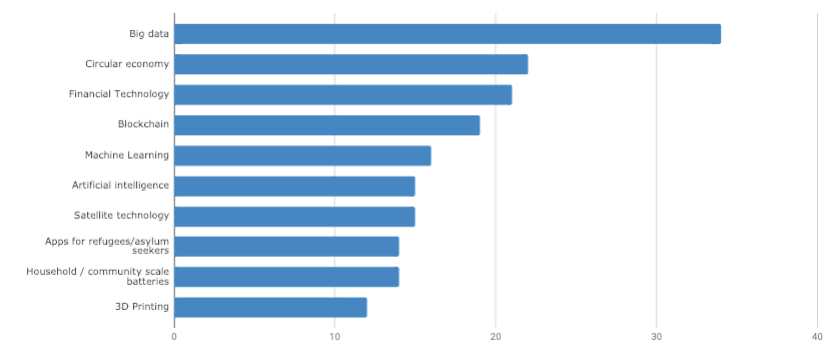5 frontier technology trends shaping international development
Frontier technologies are emerging forms of tech “that will reshape industry and communications and provide urgently needed solutions to global challenges like climate change” and “have the potential to displace existing processes”, according to the OECD.
In 2016, staff from the Department for International Development (DFID) responded to a survey on what frontier technologies they believed held the greatest promise for development. Those survey results fed into a report into Ten Frontier Technologies for International Development and the creation of Frontier Technology Livestreaming, a three-year programme helping the UK apply frontier technologies to development challenges.
This year, we carried out the survey again, gaining insight from 115 DFID staff across 37 countries, to understand how technology perceptions have shifted, which technologies are considered the most promising and what has changed in the fast-moving world of tech.
What’s changed in tech?
The Top 10 technologies (seen below) have changed dramatically from our 2016 survey. The 2016 survey had a significant emphasis on hardware, with condensers, desalinators, solar-powered batteries and smart grids dominating the list. This time, it’s a different picture, with all but two of the top ten focused on software and processing.

The top 10 technologies for development in 2019 results
Now, we deep dive into the top five technologies to explore how they are currently being applied in development.
FinTech
FinTech has been a big talking point of development for some time now, with an increasing focus on how digital financial services can encourage development through financial inclusion.
Subscribe to our newsletter
Our weekly email newsletter, Network News, is an indispensable weekly digest of the latest updates on funding, jobs, resources, news and learning opportunities in the international development sector.
Get Network NewsAt the Frontier Tech Hub, we’re particularly interested in applications of FinTech technologies which can support access to and usage of a product/service, which can have positive multiplier effects. For example, FinTech has enabled PAY-GO Bicycles in Zambia through the use of flexible payment models and product bundles for rural customers.
Customers in Southern Province are benefiting from access to bicycles and solar lights via an affordable payment plan, with payments made via an SMS system suitable for feature phones.
Big data
Big data is the name given to a really big data set, from a range of different sources. In a development context, like most others, people leave behind a digital trace through their activities. This could be from someone’s own activity (e.g. phone usage) or from data that is collected from them (e.g. surveys).
These extremely large data sets may be analysed computationally to reveal patterns, trends, and associations, especially relating to human behaviour and interactions. We have seen this in action by using data to understand electricity demands in rural hospitals in Zimbabwe to support the piloting of solar batteries to improve health outcomes.
Here’s what DFID staff had to say:
“Big data will help DFID with predictions and studying trends that will help with planning and allocation of resources to the most needy and in areas that promise high development returns.”
“Big data is both a massive opportunity and a massive risk for those living in poverty and instability. We are also at real risk of being hijacked by it while not understanding it ourselves.”
Machine learning
Again data-related, machine learning is the ability for computers to learn from experience (i.e. the data they receive) and improve their performance. This can be a subset of artificial intelligence, an area which is much broader in reach and scope.
In development contexts, machine learning presents the opportunity to rapidly, effectively and at lower costs, analyse big data and adjust an intervention or programme accordingly.
There is a multitude of applications for this data-machine learning combo. One example from the Frontier Tech Hub is the use of machine learning to improve road conditions in Tanzania using satellite data.
Circular economy
When thinking about a circular economy we look for ideas which in their design focus on applying technology to enable the reuse of materials and removal of waste.
In development contexts, there is a belief that systems designed in this way can harness a dual benefit. They can help developing countries contribute to a transition to more responsible economic activity, while potentially supporting “leapfrogging” in some industries as more industrialised nations adapt more slowly.
DFID staff are increasingly recognising the potential:
“Circular economy can be considered in the way of promoting recycling, reusing and reducing emission to ensure environmental and broader socio-economic aspects to the work DFID does.”
Blockchain
Blockchain (and other distributed ledger technologies) is a system for keeping records and storing transactions. Its potential advantages from a development standpoint are the ability to transact in a transparent and distributed manner.
One area that the Frontier Tech Hub has explored as part of its foresighting studies is the ability for these technologies to encourage transparent results-based financing in development, an area which we believe holds promise for the sector. You can find our report here.
We are also using blockchain technologies to track humanitarian supplies.
But it’s not just about the tech
Although we’ve teased out “individual” technologies in our survey, we aren’t generally applying these technologies individually in the complex contexts we work in. Here are some cautionary notes to consider when looking at technology propositions for development programming:
- Technology is regularly muddled with the application of technology. It’s often tricky (and unhelpful) to tease out the technology from how it is used, e.g. technology for reporting human rights abuses requires a channel, power, connectivity and more.
- Technology is typically more useful in combination with other technology. This is a trend that we’re seeing across our portfolio and something we’re going to spend more time analysing in the coming months. True frontiers are being unlocked by combining solar batteries with data in Zimbabwe and satellites with machine learning in Tanzania.
How have we responded to the survey?
Since the survey, we have run our fourth call for applications at the Frontier Technology Hub. As you can see from the cohort of successful applicants, the pilots combine many of the technologies found in the top 10 of our survey. We look forward to seeing how these pilots progress over 2019-2020, and testing in earnest how some of these technologies fare when applied in areas of particular uncertainty.
Join our Tech for Development Group to participate in the discussion around the impact that new technologies are having on people’s lives and international development work. Groups are free for Bond members to join and take part in.
Listen to our podcast on the potential and pitfalls of blockchain as we explore how this new technology can be utilised for more effective and transparent activities.
Category
News & ViewsThemes
Futures and innovation



